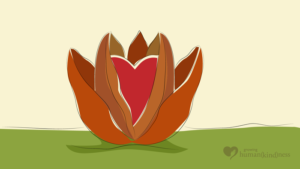On a recent support call, we talked about this common challenge: how to move from, “I should do x,y,z, because that would be smart, and benefit me,” to actually doing x,y,z … to making changes.
This is an important question, and one that many of us have struggled with in our lives. We intellectually understand the benefit of many practices. Yet, how can we move from the space of intellectual understanding to practice and action? I share my answer below.
“The first thing is how much we need compassion. Because it is so easy to read something in a book and to intellectually get what we need to be doing and putting it into practice is a completely different animal, isn’t it? I hope that this very dilemma that we find ourselves with, that dilemma of the effort and the challenge it might take to put into practice; I hope that really helps you befriend your tender human self.
A lot of us human beings, we tend to be really hard on ourselves. I think those of us who struggle with food, we tend to be extra-hard on ourselves; we tend to be people who have really tried to get our ‘stuff’ together.
If there’s anything that food has taught me, is it’s taught me that getting it ‘more together’ is not what my heart is really, really needing. That’s what really kept me stuck in food for so long. I kept trying to control it. I kept trying to just push myself harder. I thought, ‘Okay. Tomorrow, I’m just going to really get it together.’ I am constantly humbled by how much my intention to finally get my life together once and for all … how that’s really not what’s it’s about.
What I mean by this is — I’m not saying we should just give up, I’m not saying we should just go to apathy, because that can be even just as painful. What I’m saying is this: Rather than looking at this as, ‘How do I actually do it?’ and approaching ourselves with all that frustration, I invite you to look at how you relate to it.
That’s what your heart most truly wants, is to have a kind relationship, with that thing that you’re struggling with.
I’m going to do a little bow to my teacher, Mark Silver, who really finally put that into words — he’s the one that really made that light bulb go on for me. How are you relating to your own frustration about your ‘challenges with changing?’ When I say that right here in this call, I can feel my whole heart; my body just softened.
When we stop judging ourselves and relate kindly to it, space opens up.
And with that space, it opens up opportunity and creativity. It opens up our minds to new solutions we may not have thought of before. It’s like this whole other feeling arises, where we’re more connected to wisdom, opportunity, and possibility.
We can’t think our way into solutions. I’ve been telling myself that over and over lately, because my mind will start churning about some problem in my life and I’ll start thinking, thinking and planning, planning, and then it’s always this constant reminder, ‘Karly. Thinking is not going to solve this for you.’ I’m not saying that all thought is wrong; no thought can be beautiful, but when my mind is churning and my monkey mind is going, ‘blah, blah, blah,’ that’s not the space that’s going to solve my problem.
It is by dropping into this space of relationship like, ‘Okay. How am I relating? How can I be kinder?’ Then I’m more apt to connect to truly helpful thoughts, rather than just the worries, and anxieties, and fear-driven jumbles in my mind.”
Another tool that Karly mentions soon after in the call is that of support, or what Karly often calls, “coming alongside yourself.”In coming alongside ourselves, we offer ourselves a helping hand, a kind word, and the courage to reach out to others for help as well.This practice also helps us put our intellectual understandings of change into action.
Wanting more hands on help:
- If you liked this article, you may also like this post on The alchemy of self acceptance – how acceptance makes change possible.

Hi, thanks for sharing. I'm wondering if it's OK to copy some of the text in my site?